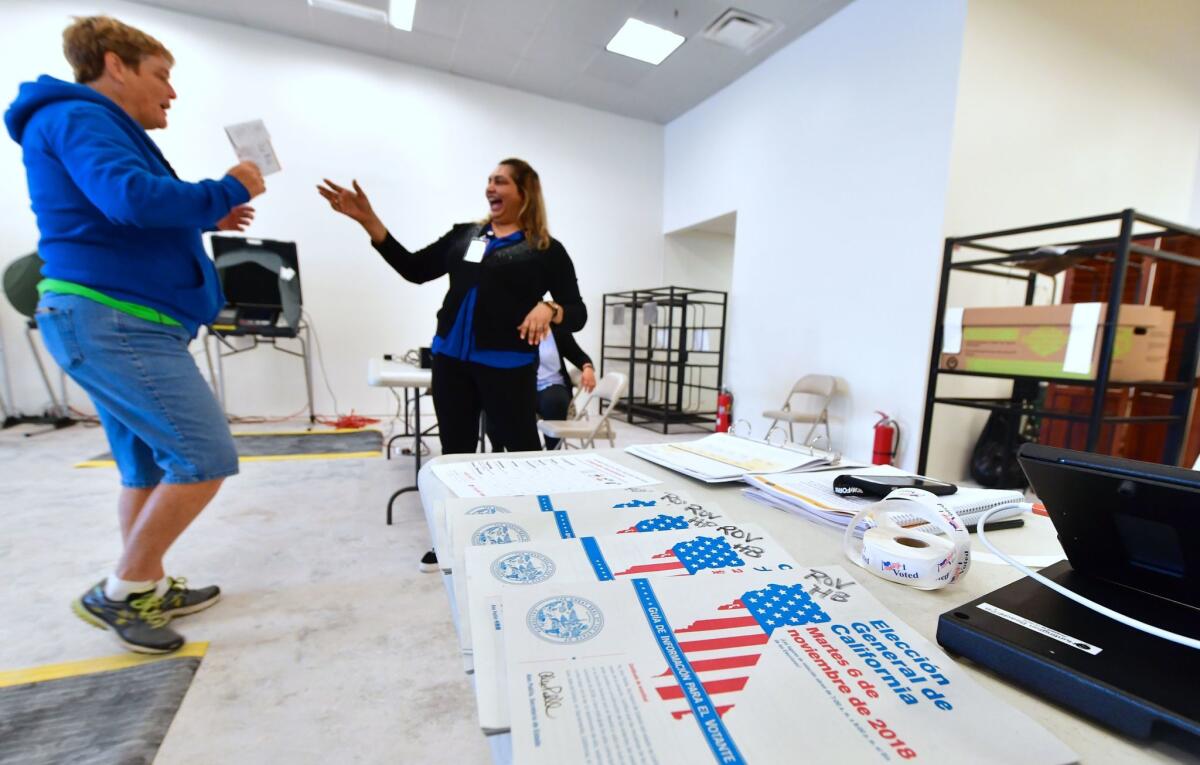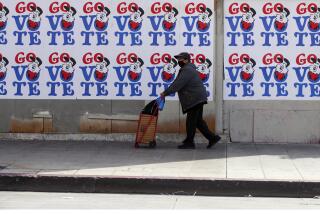Here are the candidates running for statewide office in California

More than 19 million registered voters in California have the chance to cast ballots in the November election. And they’ve got a lot to consider: Voters will elect a new U.S. senator, eight statewide officeholders and a Board of Equalization member for their district as they also weigh 11 propositions and who should represent them in the U.S. House of Representatives.
Here’s your guide to the statewide races on the ballot.
Though both of California’s candidates for U.S. Senate are Democrats who agree on many of the same policies, they have tried to distinguish themselves in the race by highlighting their differences in style and approach.
Sen. Dianne Feinstein is going after a fifth full term in the Senate, looking to extend her 26 years in Washington. She has emphasized her record in Congress, arguing that she has been able to achieve results under Republican control while her opponent’s accomplishments came as leader in a Legislature controlled by those in his party.
Feinstein, a centrist, says her seniority gives her an edge, citing her resistance against President Trump’s judicial nominees, and work to secure millions in funding to upgrade transportation and water infrastructure, among other things. Her top three priorities in office are achieving universal healthcare, comprehensive immigration reform and reducing gun violence, she said.
State Sen. Kevin de León of Los Angeles is challenging Feinstein from the left, touting his progressive credentials by reminding voters of the liberal causes he advanced during his three years as leader of the California Senate. In a rebuke of Feinstein, the California Democratic Party endorsed De León in July, reflecting the increasing strength of the state party’s liberal activist core.
He is a backer of Medicare for all and has called for the impeachment of Trump. He wrote California’s “sanctuary state” bill and another signed into law this year that requires the state to get all its electricity from clean power sources by 2045.
But the two have similar positions when it comes to the issues. Both are against repealing the state’s recent gas tax increase and both favor stronger gun controls — Feinstein wrote the assault weapons ban and is working to reinstate it, and De León supports a ban and pushed for tougher gun restrictions during his time in the Legislature. Both aren’t fans of Gov. Jerry Brown’s delta tunnels project.
The two Democrats also agree that the U.S. Senate, if their party takes control, should take another look at the sexual assault allegations made against Supreme Court Justice Brett Kavanaugh.
De León has said Feinstein has been too easy on the Trump administration. In one interview with The Times, he criticized her for telling a San Francisco audience last year that she hoped Trump would learn and change and become “a good president.”
But Feinstein has more money, better name recognition among voters and a big lead in the polls while De León is struggling to raise his profile in California.
After his combined 16 years of governorship, California will soon say goodbye to Gov. Jerry Brown and select a new chief executive — Republican businessman John Cox or Lt. Gov. Gavin Newsom, a Democrat.
Cox, 63, has never been elected to public office, despite several tries in his former home state of Illinois. He has instead highlighted his business acumen and political outsider status in his campaign, blaming Sacramento Democrats for the rise in poverty, homelessness and cost of living in the state.
Cox’s biggest coup in the primary race was winning Trump’s endorsement. It helped the San Diego County resident consolidate the Republican vote, assisting his rise to second place in the primary. But the president’s backing could hurt him in this deep blue state.
If elected governor, Cox has promised to work toward repeal of California’s sanctuary state law, which limits cooperation between state and local law enforcement and federal immigration officials. Cox is opposed to the state’s increased gas tax and vehicle fees, and has made it a focus of his gubernatorial bid. He is chairman of the Proposition 6 campaign to repeal the tax increase.
Cox is also opposed to implementing a state-run single-payer healthcare system, is a proponent of vouchers for low-income students to allow families to send their children to charter or private schools and has said he would work to stop California’s high-speed-rail project.
In a state where Republicans are close to being outnumbered by independent voters, Cox is the underdog going into the election. Newsom, the Democratic front-runner in the race, leads in the polls and fundraising.
Newsom, 51, has been the state’s lieutenant governor since 2011. Before that he was the mayor of San Francisco, where he made a national name for himself by authorizing same-sex marriages in 2004. The city also adopted a universal healthcare system in 2006.
As lieutenant governor he has had fewer official duties, sitting on the boards of the University of California Board of Regents, the California State University Board of Trustees and the California State Lands Commission. A Times review of attendance records showed he missed many of those meetings.
But while serving as lieutenant governor, Newsom pushed for state ballot measures to legalize the recreational use of marijuana and stricter gun controls in California, including requiring background checks to purchase ammunition. Both measures were approved by voters.
A vociferous critic of Trump and and his policies, Newsom has earned the ire of the president, who regularly insults the lieutenant governor on the campaign trail. And Newsom has sought to differentiate himself from Cox by reminding voters that Trump has backed his opponent.
Newsom has shifted his views on numerous state issues over the years. He was a one-time critic of California’s high-speed-rail project but now says he will focus on building the line between the San Joaquin Valley and the San Francisco Bay Area before connecting it to Los Angeles. That leg will be delayed until the initial line proves to be financially feasible and can attract more money from taxpayers or private investors.
He has also criticized the Republican effort to repeal California’s recently approved gas tax increase, saying it is crucial to pay for road and bridge repairs as well as mass-transit improvements.
State Sen. Ed Hernandez of Azusa and former U.S. Ambassador Eleni Kounalakis, both Democrats, are vying for the largely ceremonial position of lieutenant governor.
The officeholder has a seat on several state boards including the University of California Board of Regents, the California State University Board of Trustees and the State Lands Commission. The position’s primary function is to fill in when California’s governor is out of the state, impeached, resigns, is removed from office or in case of death. The lieutenant governor can also break a tie in the state Senate.
Hernandez, an optometrist from the San Gabriel Valley, was first elected to the state Assembly in 2006 and then the state Senate in 2010.
Kounalakis, a prominent Democratic Party donor, was appointed ambassador to Hungary by President Obama and has never held public office. Her father, prominent developer Angelo Tsakopoulos, has been a major source of financing for her first campaign.
Alex Padilla, a former state senator and Los Angeles City Council member from the San Fernando Valley, is seeking his second term. He spearheaded a new Motor Voter act in 2015 and a new system for online business registrations. But the new systems have had hiccups: More than 23,000 Californians were registered to vote incorrectly by state DMV.
Republican challenger Mark Meuser, an attorney, is running on a campaign to stamp out alleged voter fraud. He has claimed that some counties have more voters than people eligible to vote, though elections experts said the claims misrepresent the way the data are collected.
The Secretary of State’s office oversees business and corporate filings. It also handles statewide elections and collects voter data.
Democrat Betty Yee is seeking another term as state controller, the officer in charge of paying the state’s bills and administering the payroll system for state workers. In her role, she is one of the state officials with the power to audit state agencies and local governments.
Republican businessman Konstantinos Roditis of Anaheim is challenging Yee. His campaign is built around a ”trickle-up taxation” proposal to radically alter the way the state collects taxes — cities and counties collect all revenue before a percentage of funds go to Sacramento. He is also pledging to defund the state’s high-speed-rail project.
Republican Greg Conlon and Democrat Fiona Ma are facing off for state treasurer after incumbent John Chiang, a Democrat, ran for governor and lost in the primary.
Conlon is a retired CPA who has run for the seat twice before and lost both times. Ma is a former CPA, San Francisco supervisor and state assemblywoman. The treasurer oversees the state’s investments and administers the sale of bonds and notes.
Brown appointed then-U.S. Rep. Xavier Becerra (D-Los Angeles) to replace the state’s former top cop Kamala Harris after she was elected to the U.S. Senate in 2016, so Becerra enters the race to be California’s top justice official with something of a head start.
The Democrat will face Republican Steven Bailey, a retired defense attorney and judge from El Dorado County in northern California.
Becerra has made headlines by suing the Trump administration over a number of federal policies, a strategy Bailey said he would not pursue as attorney general. Bailey has also come out in opposition to California’s sanctuary laws.
The race for insurance commissioner could make state history. Steve Poizner, who held the position as a Republican between 2007 and 2011, is running for the seat again as an independent. If he beats state Sen. Ricardo Lara (D-Bell Gardens), Poizner would be the first “no party preference” candidate to win statewide office.
If Lara is elected, he would also make history as this first statewide elected official to have come out as gay. Lara’s tenure in the state Senate has included bills to protect immigrants in the country illegally and a proposal to create a single-payer health system. He is the chairman of the Senate Appropriations Committee.
The insurance commissioner, a role created by voters in 1988, oversees the Department of Insurance, a consumer protection agency with more than 1,400 employees. The commissioner has a hand in considering rates charged for auto and home insurance.
The state schools chief runs the California Department of Education and executes policies set by the State Board of Education. The department also oversees standardized testing, the collection of student data, the use of state and federal funds and interprets new education laws and develops regulations, including those that affect charter schools.
This year’s contest has been another expensive proxy war between supporters of charter schools and teachers unions.
Marshall Tuck, an education consultant, ran a charter school organization and was chief executive of the Partnership for Los Angeles Schools, which managed some low-performing schools. He is being backed by charter supporters.
Tony Thurmond is a former social worker in Bay Area schools. He was elected to the Richmond City Council and the local school board before moving to the Legislature. He is backed by teachers unions.
Tuck has stressed stricter accountability for teacher performance and in extending the time required for teachers to earn tenure. He’d also like to see teachers receive higher pay if they agree to work at more challenging schools.
Thurmond wants all teachers to earn more money as part of a strategy to combat a teacher shortage. In the Legislature, he has focused on programs that provide more funding to children with special needs.
The Board of Equalization is tasked with setting rates for gas taxes and pipeline levies and making sure counties fairly assess property taxes.
It formerly had a broader role involving tax and fee collection, but was stripped of many of its responsibilities in 2017 following a series of controversies. Many of its employees in charge of collection of sales and excise taxes were shifted to the new California Department of Tax and Fee Administration.
District 1: Tom Hallinan (D) and Ted Gaines (R)
District 2: Malia Cohen (D) and Mark Burns (R)
District 3: Tony Vazquez (D) and G. Rick Marshall (R)
District 4: Mike Schaefer (D) and Joel Anderson (R)
Times staff writers Howard Blume, Patrick McGreevy, Seema Mehta, John Myers, Joy Resmovits, George Skelton, Dakota Smith, Ralph Vartabedian and Phil Willon contributed to this report. Icons courtesy of Noun Project, including Made by Made, Anbileru Adaleru, Vectors Market, Adrien Coquet, Dev Patel, Alex Tai, Fatih Studio, Guilherme Furtado and Leonardo Schneider.
Twitter: @jpanzar
More to Read
Get the L.A. Times Politics newsletter
Deeply reported insights into legislation, politics and policy from Sacramento, Washington and beyond. In your inbox three times per week.
You may occasionally receive promotional content from the Los Angeles Times.











